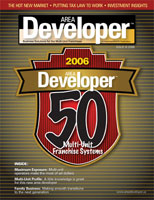In Praise of Flex-Time
Building a strong work force requires innovative hiring policies
One of the biggest concerns for franchisees is attracting, hiring, and retaining quality employees. And one of the biggest concerns for working Americans is balancing the competing demands of home and work. For franchise owners willing to be creative, this represents a tremendous opportunity.
In previous columns, I've written about how to build your multi-unit organization from within through effective training programs and a defined career path for your associates. But first you have to find them and hire them. To do this, franchisees must find ways to make their organization more attractive to potential job applicants.
I recommend contingent workforce strategies because they provide an unlimited resource for top-notch talent. I've used flex scheduling in my own business for years and credit it with improving both productivity and work quality. Among the alternatives are part-time work, compressed work weeks, job sharing, telecommuting, and unpaid personal leaves of absence.
Some employees, looking for a better balance between work and home, are motivated toward alternative schedules. And managers, increasingly, recognize that making concessions for an employee's family obligations is not a sign of permissiveness or unnecessary coddling. Rather, it is a good way to help recruit and retain valuable workers.
When people are allowed to work when they want and as much as they want, they are more likely to enjoy their work and be productive. Some want or need flexibility in their hours because of circumstances beyond their control. Others like being "their own boss," working when and where they wish. And some simply are not interested in a career climb, so full-time commitment is not important to them.
Often, these employees are working to sustain an expense, such as college tuition, the cost of private music lessons, or extended medical care for a loved one. Because they are pursuing a valuable objective, they usually are steady, motivated employees.
Many multi-unit franchisees have found that time flexibility, far from disrupting operations, actually improves both morale and employee retention. It also can increase productivity and decrease turnover, tardiness, and absenteeism--reducing hiring costs and the expense of training new workers.
Part-time employees generally do not have "part-time commitment," as some employers fear. In fact, the energy of employees who work only part-time is released during a shorter period, thus it's common for flexible hours to increase productivity--which is another way of saying a flexible hours policy reduces an organization's total compensation costs.
Productivity often increases because burnout decreases. Burnout has been called a "malaise of the spirit." An employee who once was a prime contributor no longer seems excited about her job. A formerly cooperative employee becomes inflexible and difficult to get along with. A once-reliable employee now often calls in sick.
In addition, burned-out employees can sabotage otherwise positive, productive co-workers, as they are easily fatigued, bored with their work, quick to anger, cynical, hostile, apathetic, and have a difficult time recognizing the problems and concerns of others. You may be able to prevent these problems by offering flexible hours.
Contingent workers might solve all your staffing problems. Are you pursuing this source of employees assertively? Shout your welcome to anyone who wants to work hours that don't jibe with the standard nine-to-five, five-days-a-week schedule. Make yourself attractive to contingency workers by adjusting your schedule to their needs.
When you publicly offer flexible hours, that single move reaches a large number of prospects in your community who otherwise wouldn't consider your jobs. "What's your pleasure?" could be your message to your school connections, network contacts, present employees, mothers, teens, seniors--and even customers who might be potential employees.
- Stay-at-home parents. Many parents who hesitate to work because their children attend school will work if you allow them to choose hours between the time their children leave for school and the time they return home. This group used to be almost all mothers, but an increasing number of stay-at-home fathers are now potential flex-time candidates.
- Job sharing. You might receive an enthusiastic response if you announce that you are willing to work with two or more applicants on a job-sharing assignment. It's an opportunity to re-enter the workforce not only for a stay-at-home parent, but also for single parents, and perhaps even for a married couple. Job-sharing employees share one salary, set of benefits, and responsibilities. Participants are responsible for calling their work partner if they are sick, plan to be out of town, or simply don't feel like working.
From the employer's point of view, job "partnering" (sharing) is a way to get full-time work from part-time employees. Productivity increases, too: instead of one stressed-out, burned-out employee, employers have two effective, energetic employees available. - Seniors. People are living longer and staying healthier than ever--and are finding they want more from life than golf, fishing, gardening, and visiting the grandchildren. About half of the retired persons surveyed by the AARP indicate they would return to work if they found the right opportunity.
A good reason for not hiring older people is hard to find. Statistics show seniors are more reliable than younger people, call in sick less often, and aren't as apt to be distracted by child-care responsibilities, socializing, or other activities favored by the younger generation. But to convince seniors to work for you, you must first convince them that you understand their needs and interests--their motivations.
With Social Security guidelines prohibiting full-time work, seniors make excellent candidates for flex scheduling. Many are early risers, making them ideal for early morning shifts. And while many seniors may return to work voluntarily, others may need to supplement their retirement or healthcare plans with part-time employment.
Seniors bring a wealth of experience, stability, and loyalty to an organization. Many have customer-service savvy the younger generation lacks, are more polite, and can serve as mentors and role models to help build your organization.
Remember the old TV ad showing a friendly-looking, grandfatherly man on his way to an early morning job at McDonald's? He was pictured as capable and endearing, able to show the younger employees a thing or two. Those ads solicited job applications from older workers.
Another QSR franchise, Kentucky Fried Chicken, displayed its respect for the older generation through The Colonel's Tradition, KFC's national Innovative Initiative for employing older workers. And of course the brand proudly displays the fact that it was founded by an elderly man in a white suit, known to millions simply as "The Colonel."
Once franchise organizations commit to flex scheduling and hire a number of people to work flexible hours, they will find it easy to rapidly adjust the strength of their labor force in response to seasonal or market demands. They can staff up or down accordingly, without routinely hiring and firing (a huge drain on company resources). And once flex-time associates are hired, employers who remain flexible in accommodating their changing scheduling needs will find this an effective retention tool.
In many cases, part-time employees grow into valuable full-time associates, especially when they are given the same training and opportunity as full-timers. On the other hand, if they prefer to continue working reduced hours because it suits their needs and lifestyle, flex-time employees will often remain steady, loyal, and dedicated workers-rock-solid assets to your franchise for years to come.
Thom Winninger has been referred to as America's Market Strategist. His expertise is in value differentiation and revenue growth, and he speaks at over 75 conferences a year. His message has appeared in over 300 trade publications, and he has authored four books. View him live at www.winninger.com.
Share this Feature
Recommended Reading:
FRANCHISE TOPICS
- Multi-Unit Franchising
- Get Started in Franchising
- Franchise Growth
- Franchise Operations
- Open New Units
- Franchise Leadership
- Franchise Marketing
- Technology
- Franchise Law
- Franchise Awards
- Franchise Rankings
- Franchise Trends
- Franchise Development
- Featured Franchise Stories
FEATURED IN

Multi-Unit Franchisee Magazine: Issue 3, 2006

$20,000
$300,000





 The multi-unit franchise opportunities listed above are not related to or endorsed by Multi-Unit Franchisee or Franchise Update Media Group. We are not engaged in, supporting, or endorsing any specific franchise, business opportunity, company or individual. No statement in this site is to be construed as a recommendation. We encourage prospective franchise buyers to perform extensive due diligence when considering a franchise opportunity.
The multi-unit franchise opportunities listed above are not related to or endorsed by Multi-Unit Franchisee or Franchise Update Media Group. We are not engaged in, supporting, or endorsing any specific franchise, business opportunity, company or individual. No statement in this site is to be construed as a recommendation. We encourage prospective franchise buyers to perform extensive due diligence when considering a franchise opportunity.